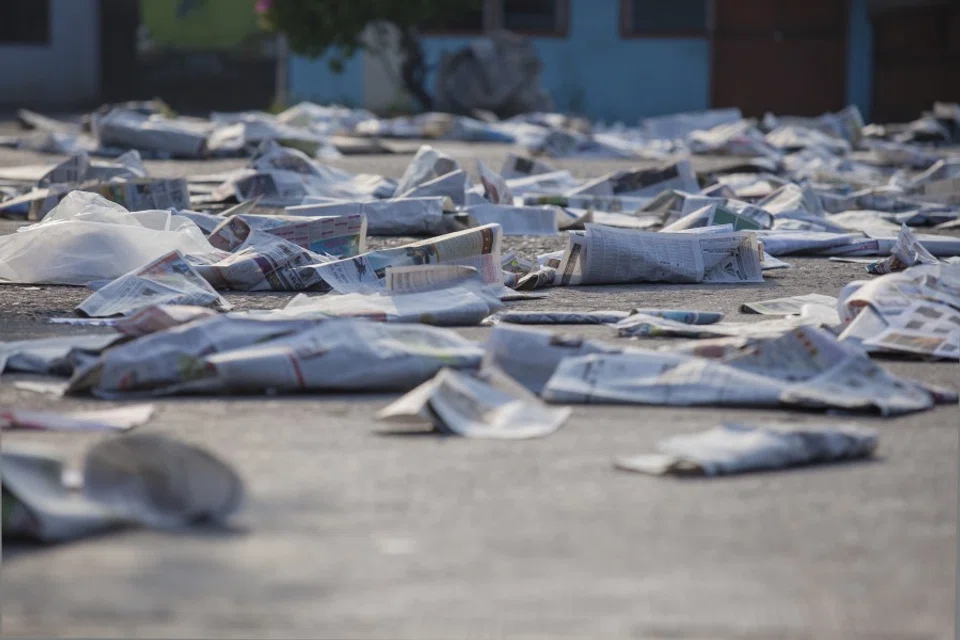The second life of yesterday's papers
Hua Language Centre director Chew Wee Kai thinks fondly of old newspapers and the purpose they served in the past and still serve in the present. From spreading the news of the day to being used as decorations and even polishing glass, their role is humble no doubt, but always useful.

Have you seen the old man In the closed-down market Kicking up the papers With his worn out shoes? In his eyes, you see no pride Hand held loosely at his side Yesterday's paper telling yesterday's news
One evening, my memories were stirred as a friend sent me an old song called Streets of London. Over 50 years, Ralph McTell's voice was never far away, just dormant in my mind.

An old lead-printed newspaper sheet carrying news and messages from all over - what a sacred mission. But once the day is over, it might become like yesterday's rotten leftovers: of much lower value, piled up in some neglected corner, its tired visage no longer as fresh and attractive as the day before. Months later, those piles of old newspapers are only worth scrap and sold by the kilogram to the karung guni or rag-and-bone collector, after which it might be transformed into recycled paper or go on drifting in an alley, letting its remaining light shine through in different ways.
As a child, it was rumoured that English-language newspapers were worth more. To my memory, in the days before plastic bags became the norm, neighbourhood stores used to put biscuits and the like in little foot-high paper bags, which were nearly all folded and glued out of English-language newspapers, or occasionally Western magazines.
Scrap and a scrapbook of memories
At the time, an old man told me that Western newspapers were of better quality and the ink did not rub off the page easily. True enough, the paper used in Western magazines was smooth and glossy, with full-colour images. In those days of scarcity, we couldn't resist cutting them out to keep, like collecting stamps. The neighbourhood store or snack stall owner would also cut old newspapers into squares about the size of a handkerchief, and grab five cents worth of preserved plums or a handful of sweet and spicy cuttlefish slices, put them on the paper, wrap it up and hand it to you.

Oh! Previously, the ultimate fate of old newspapers was ending up as toilet paper for the plebs. That might sound disgusting, but life is all about compromises. If one cannot afford toilet paper, using old newspapers instead is also a positive attitude to life. While using newspapers as toilet paper feels like lowering the status of the noble word to servicing the "behind", there is no intent to insult the educated and cultured.
About five years ago, I read an article in Chinese titled "After Brexit, will Britain go back to the days of using old newspapers as toilet paper?" (英国脱欧后会重回旧报纸当厕纸的日子吗). The implicit meaning is that using old newspapers as toilet paper is an indicator of civilisation and a measure of the quality of life.
Maybe I should talk about something a bit more cheerful related to old newspapers. And for that, I have to go back to my childhood.
Recycling and kite-flying dreams
When I was a kid, I longed for a kite, but never dared to tell my mother, and my dream of flying a kite remained buried. Once, I went to town with my father, and found the city kids on the second floor of the store, flying tile-shaped kites folded out of paper. They were just thin sheets of paper on a short string, floating listlessly - it was no fun to watch.
When I got home, I was ecstatic to find some bamboo strips among a pile of assorted items. I whittled them and sanded them smooth to make the frame, cut up an old newspaper and glued it on, and added two strips as tails. The next day, the wind came, and that newspaper kite went right up into the clouds.
Gazing at the kite tails waving in the air, I felt the satisfaction of a child in getting everything just right, and it felt even better than a bunch of village kids running around kicking a ball scrunched together out of newspapers.

About 40 years ago, in the early days of China's reform and opening up, my friends and I made a trip to Huangshan on a whim. On our return to the foot of the mountain, it was dark and all the standard lodgings were full, so we had to think about settling our lodgings while we walked the streets.
As we were fretting, we spotted an unobtrusive sign pointing to a "farmer's inn". After following the meandering road for a while, we finally came to the lodging, where we found out that it only cost two RMB a night. After we were checked in, the owner led us to climb up a bamboo ladder to the loft. It was low, and we almost touched the ceiling when we stood, but we were too tired to object.
Looking around, the most cheering thing about the room were the rough walls, on which was stuck a full-colour page of People's Daily.
Globe-trotting with newspaper cuttings
After walking an entire day in the height of summer, I was all sweaty and uncomfortable, and went downstairs to ask where I could shower. The owner replied that there was a stream less than a hundred metres away. By now, everywhere was pitch dark, but I still went. As I immersed myself in the cold water of the stream on that moonless night, the flowing water washed away all my fatigue.
Back at the loft, I switched on the light - a single dangling electrical wire attached to a little five-watt bulb, emitting a dim, sleepy yellow light. I switched it off and slept till daylight.
The next morning, outside the window was a row of pumpkins of various sizes welcoming the dawn, a sketch of country life.

Turning back inside, the light was of an uneven beauty. It was only then that I realised the wooden bed where I had slept so deeply was 100% self-made. It was more like a large goods frame; on the bed itself was a mat, with no mattress. Looking around, the most cheering thing about the room were the rough walls, on which was stuck a full-colour page of People's Daily. Lying on the bed, reading outdated news accompanied by world leaders crossing paths with me in this tiny space, I felt the wonders of a time and space warp.
In the kampung where I lived as a child, there was also a wall where old newspaper sheets were stuck, except it was pages of Sin Chew Jit Poh that were stuck on the wooden wall in my neighbour Auntie Yan's house. I liked standing in front of that wall looking at the images and reading the society stories, or celebrity news and breaking world news.

As society became more affluent, old newspapers gradually lost their shine, and they were mostly used to polish glass, which gave better results than using cloth. People quietly age with time, like an old newspaper on a street.
No matter. Old newspapers can make glass shine; there is still a brilliant afterglow.
This article was first published in Lianhe Zaobao as "旧报纸".



![[Photos] Fact versus fiction: The portrayal of WWII anti-Japanese martyrs in Taiwan](https://cassette.sphdigital.com.sg/image/thinkchina/3494f8bd481870f7c65b881fd21a3fd733f573f23232376e39c532a2c7593cbc)

